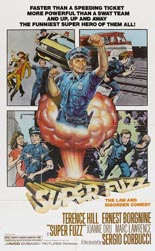
 I have warned my kids that whatever pieces of popular culture they like today, they’re bound to wonder what they were thinking, 20 years from now. I speak from experience, having revisited Super Fuzz, the Italian superhero spoof I saw in theaters for David Huckabay’s 10th birthday party. There wasn’t a kid among our fourth-grade group who didn’t find it hysterical, both then and multiple HBO and VHS viewings later.
I have warned my kids that whatever pieces of popular culture they like today, they’re bound to wonder what they were thinking, 20 years from now. I speak from experience, having revisited Super Fuzz, the Italian superhero spoof I saw in theaters for David Huckabay’s 10th birthday party. There wasn’t a kid among our fourth-grade group who didn’t find it hysterical, both then and multiple HBO and VHS viewings later.
Fresh from the police academy, Officer Dave Speed (Terence Hill, My Name Is Nobody) gets his first solo assignment of tracking down a parking violator, but accidentally explodes an experimental rocket with one bullet while trying to frighten an alligator. (Don’t ask.)
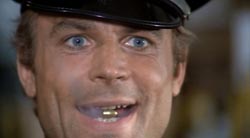 On the plus side, he gains super powers from the fallout to which he’s exposed. Dave can see through walls, run really fast, walk on water, move things with his mind, catch speeding bullets in his teeth, make a stadium disappear — basically anything and everything, as long as he doesn’t see the color red. These feats of strength irk his tubby partner (Ernest Borgnine, Escape from New York) to no end. Why? Comedy, I guess.
On the plus side, he gains super powers from the fallout to which he’s exposed. Dave can see through walls, run really fast, walk on water, move things with his mind, catch speeding bullets in his teeth, make a stadium disappear — basically anything and everything, as long as he doesn’t see the color red. These feats of strength irk his tubby partner (Ernest Borgnine, Escape from New York) to no end. Why? Comedy, I guess.
While Hill remains affable as ever, Super Fuzz is no longer funny, assuming it ever truly was. As slapsticky as a Three Stooges marathon in the middle of a Keystone Kops retrospective, the movie suffers from an overall shoddiness of belabored gags, bad dubbing and a theme song that burrows into your being like a tapeworm. It’s disorienting to think that Sergio Corbucci, the director responsible for Django and other violent spaghetti Westerns, is also responsible for a movie that ends with a hero chewing enough gum to make a giant bubble on which he can float away. Where’s a badass gunslinger to shoot such a thing down when you need him? —Rod Lott

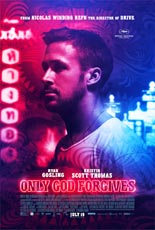
 If
If 

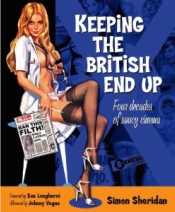

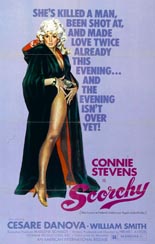

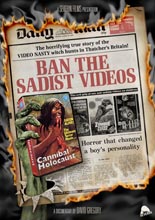
 As someone who is against censorship in any and all forms, I found the two-part documentary
As someone who is against censorship in any and all forms, I found the two-part documentary 